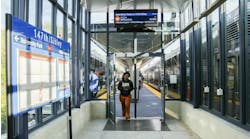First Major Measure M Project Moves into Construction with Gold Line Foothill Extension Phase 2 Groundbreaking
As elected leaders and transportation officials celebrate the groundbreaking for Phase 2 of the Gold Line Foothill Extension Project, the Los Angeles County Metropolitan Transportation Authority marked a new milestone in its ongoing efforts to transform transportation in the L.A. region. The light rail extension is the first major Measure M project to break ground following the overwhelming approval of Metro’s half-cent transportation sales tax last year.
The full light rail project encompasses 12.3-miles, and is planned to ultimately serve the cities of Glendora, San Dimas, La Verne, Pomona, Claremont and Montclair. Each of the new stations will have parking as well as passenger drop-off areas, pedestrian, bus and bicycle amenities. Metro has developed a First Mile/Last Mile program to assist cities with implementing additional access improvements to and from new Gold Line stations.
“When L.A County voters passed Measure M last year, they gave us an unprecedented mandate to create hundreds of thousands of jobs and build one of the most robust public transit systems in the world,” said Los Angeles Mayor Eric Garcetti, chair of the Metro Board. “Now, it’s our turn to deliver, and that work starts today, with this promising new phase of the Metro Gold Line.”
Within the Measure M sales tax ordinance, Metro has allocated more than $1 billion to build the lion’s share of the extension within Los Angeles County. Another $400 million has been allocated to the project using other local sales tax and Cap and Trade funds. Combined, more than $1.4 billion has been authorized by the Metro Board to build the rail line between Glendora and Claremont. The Gold Line Foothill Extension Construction Authority is also applying nearly $100 million in previous Measure R sales tax funding savings from construction of the first phase to Azusa that was completed in 2016. The construction authority is now working with San Bernardino County to fund the expansion of the line an additional mile to Montclair.
“Funding the second phase of the Gold Line Extension is the perfect example of what we’re trying to achieve through our agency’s comprehensive transportation plan,” said Metro CEO Phillip A. Washington. “As we make transit more available in new communities, we are changing the face of Southern California and creating an infrastructure inheritance for our children and grandchildren.”
The second phase of the Gold Line Foothill Extension is scheduled to be completed and operational by 2027. Metro remains committed to working cooperatively with the Metro Gold Line Foothill Extension Construction Authority to deliver the project on time and on budget. The two agencies have established Master Cooperative and Funding Agreements that define the roles, responsibilities and processes that are needed for Metro to fund the project and work productively with the construction authority. Metro will operate the extended rail line once it’s complete.


